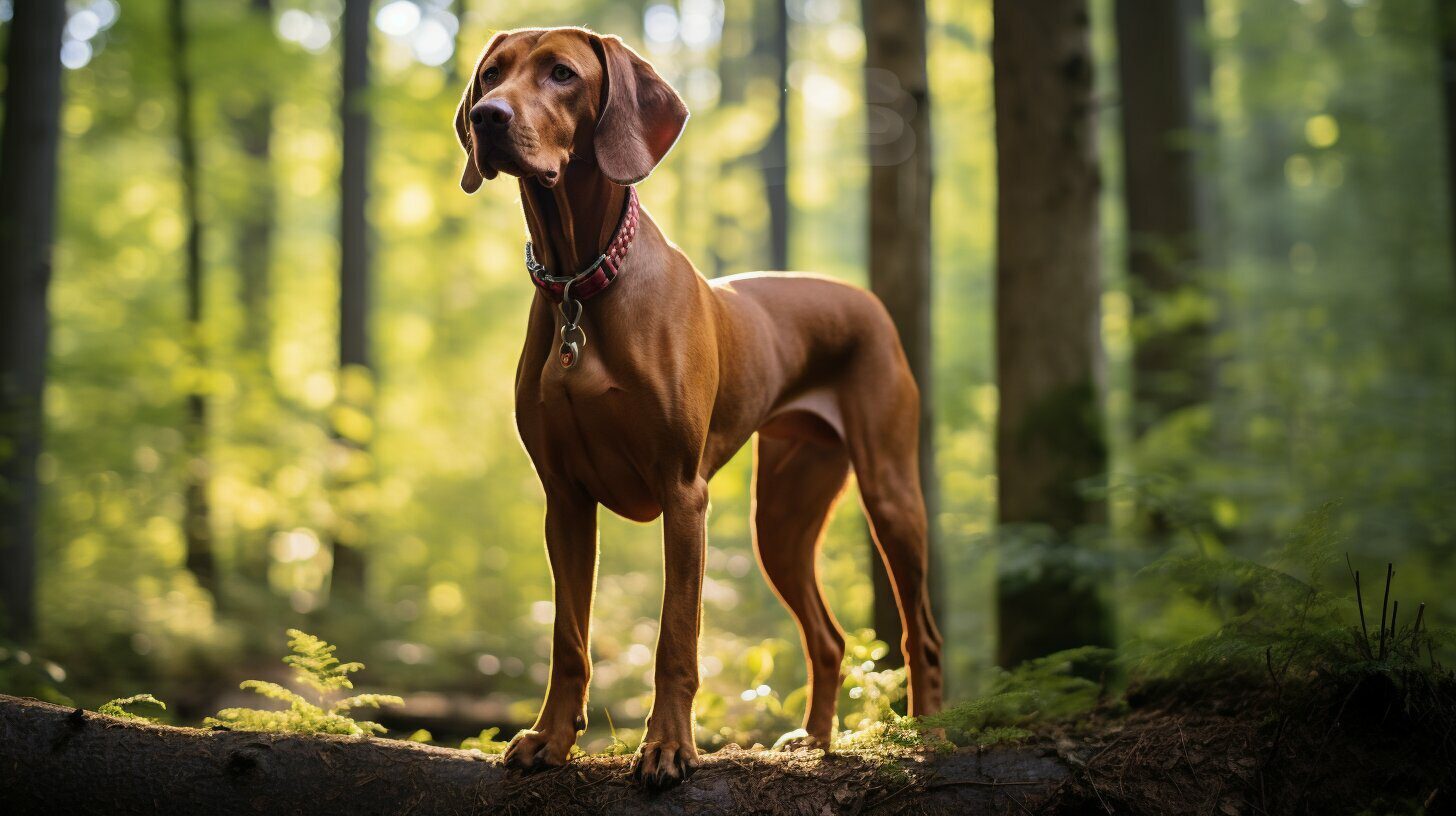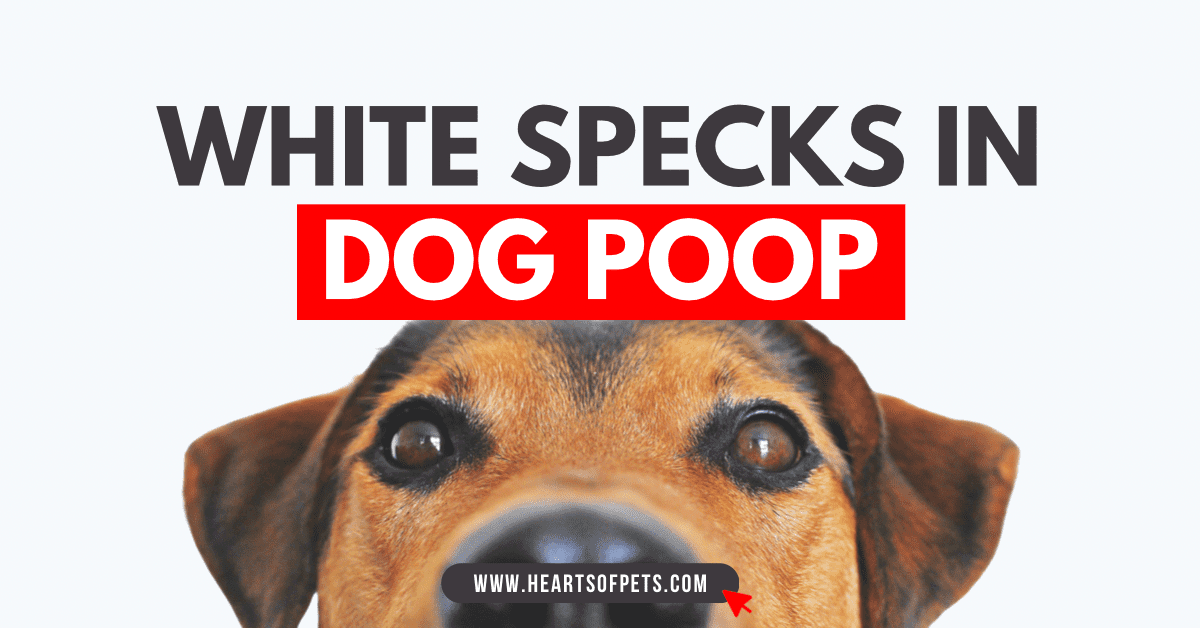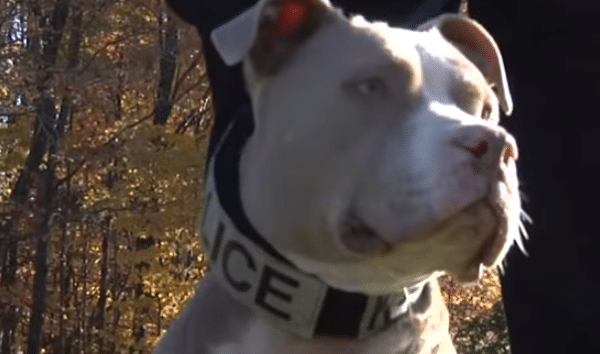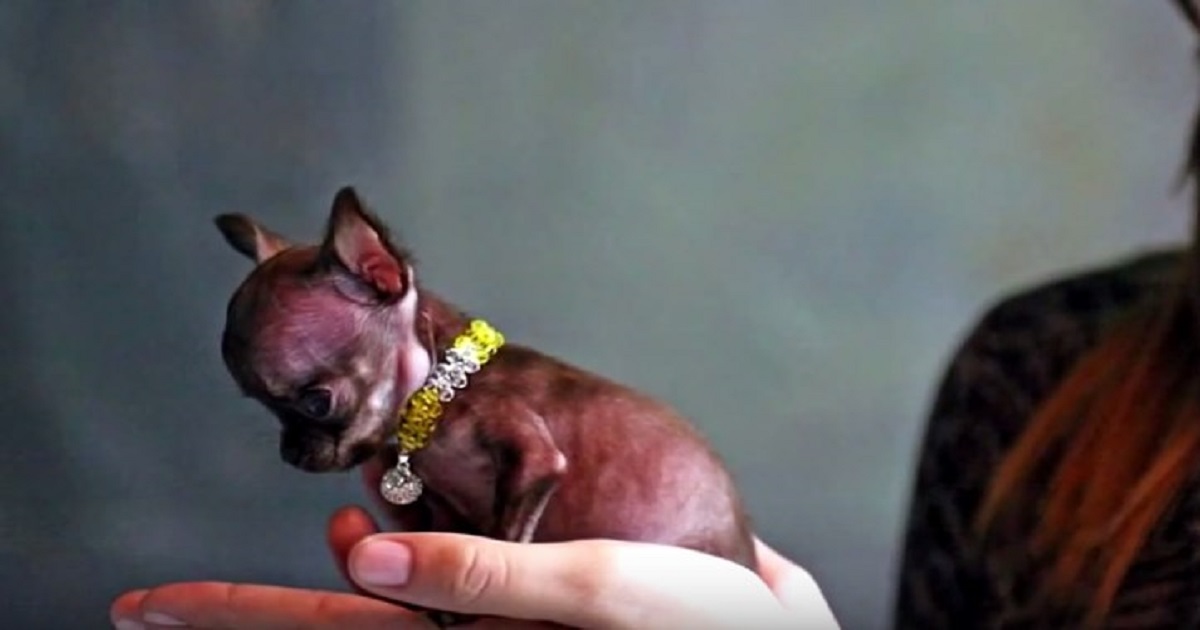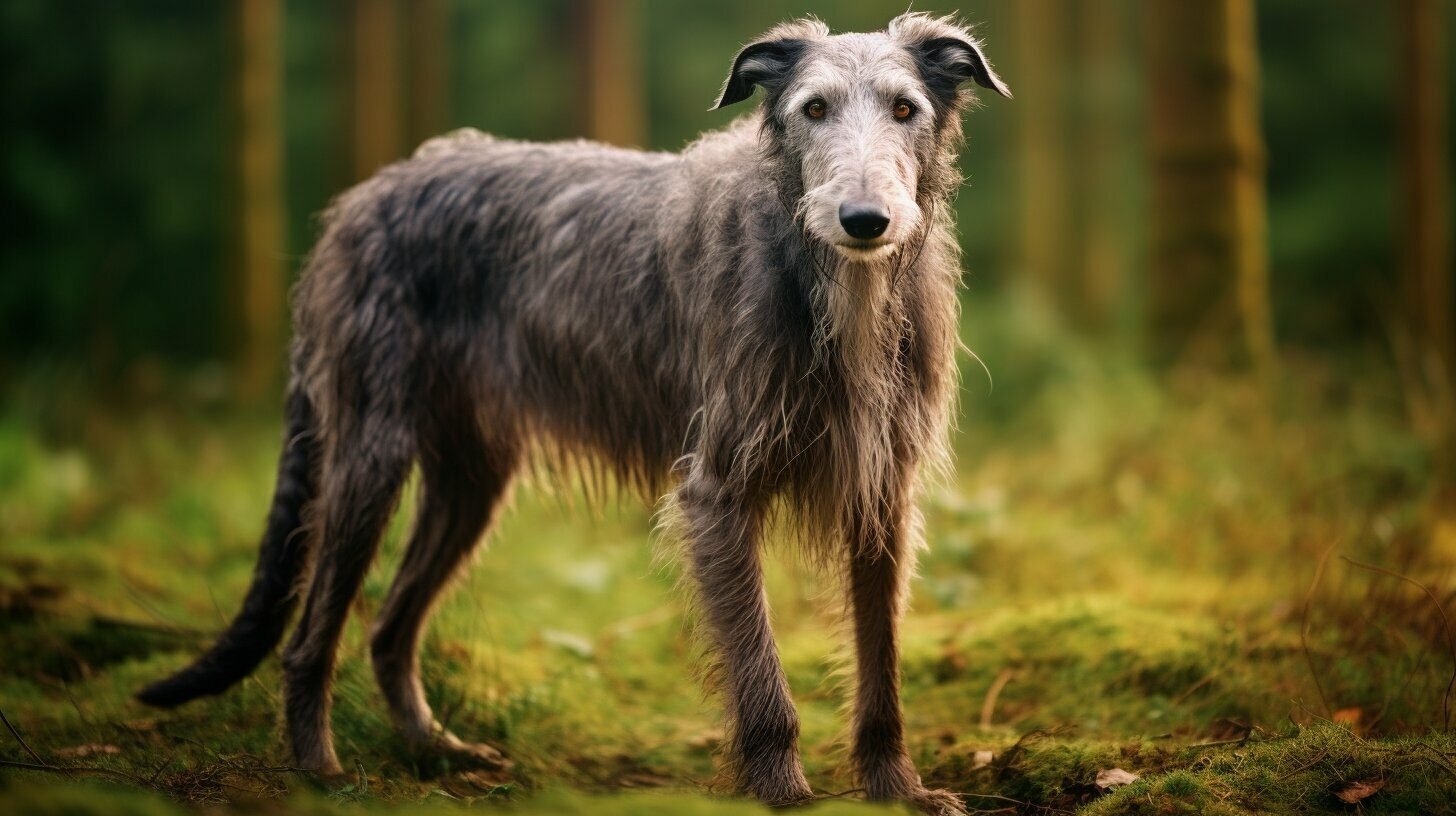When it comes to dog intelligence, it’s natural to wonder about the Miniature Pinscher’s smarts. As a journalist and dog lover, I’ve conducted extensive research to provide you with an insightful take on the matter. Discover more about the intelligence, behavior, characteristics, and training of Miniature Pinschers, and where they rank among the smartest dog breeds.
Before we dive into the details, it’s essential to understand that Miniature Pinschers are known for their intelligence, curiosity, and energetic nature. They are loyal to their families and make excellent watchdogs due to their suspicious nature towards strangers. These qualities often lead to the misconception that they are highly intelligent.
While Miniature Pinschers are certainly smart, their intelligence and trainability may not place them at the top of the dog intelligence ranking. However, their eagerness to please and fast learning abilities make them great pets and companions.
Are Miniature Pinschers Smart?
- Miniature Pinschers are intelligent, curious, and energetic dogs.
- They are loyal to their families and make excellent watchdogs.
- While not ranking at the top, Miniature Pinschers are considered a smart breed.
- Their intelligence and trainability contribute to their reputation as great pets.
- Miniature Pinschers require proper training, socialization, and care for optimal behavior.
Miniature Pinscher Characteristics and Behavior
Miniature Pinschers, also known as Min Pins, possess a unique set of physical attributes and temperament that contribute to their distinct personality. These small yet mighty dogs are a true testament to intelligence and alertness.
Physical Appearance
Min Pins have a sleek and shiny coat that comes in various colors, including shades of red, chocolate, and black with red markings. Their sturdy build and wedge-shaped body give them an athletic appearance. One striking physical characteristic of the Miniature Pinscher is their hackney-like gait, which resembles a high-stepping horse’s movement.
Temperament and Behavior
Miniature Pinschers are known for their high-spirited nature and intelligence. They are alert and always ready to explore their surroundings. Their curious nature often leads them to investigate any new sights, sounds, or smells they encounter.
While Miniature Pinschers are small in size, they possess a proud and confident demeanor. They are eager to please their owners and can be great entertainers, showcasing their intelligence in various ways. These clever canines quickly learn new tricks and commands when provided with proper training and positive reinforcement.
When it comes to their behavior around children, Miniature Pinschers generally get along well. However, they should be supervised around very young kids due to their small size and energetic nature. Additionally, Miniature Pinschers have a tendency for defensive barking and can be easily intimidated by larger dogs.
| Characteristics | Description |
|---|---|
| Size | Small |
| Coat | Smooth and shiny |
| Colors | Red, chocolate, black with red markings |
| Gait | Hackney-like with a high-stepping motion |
| Temperament | High-spirited, intelligent, alert, and proud |
| Compatibility with Children | Generally good but requires supervision around very young children |
| Behavior with Other Dogs | May be intimidated due to their small size |
Miniature Pinschers truly embody the saying “big things come in small packages.” With their distinctive physical appearance and spirited behavior, they are a delightful addition to any family.
Miniature Pinscher History
Let’s travel back in time to explore the fascinating history of the Miniature Pinscher. Contrary to popular belief, these spirited dogs are not miniature versions of Doberman Pinschers, although they do share some common ancestors.
The story of the Miniature Pinscher begins in Germany, where they were originally bred to hunt rats in stables. These pint-sized hunters were adept at exterminating vermin, showcasing their agility and keen sense of smell.
During the late 1800s, the breed gained popularity in Germany and Scandinavia, where they became cherished companions and reliable watchdogs. However, it wasn’t until the early 1900s that Miniature Pinschers ventured beyond these regions to captivate the hearts of dog enthusiasts worldwide.
In 1919, Miniature Pinschers made their way to the United States, where they quickly gained recognition for their distinctive appearance and spirited personality. The breed officially received recognition from the American Kennel Club (AKC) in 1929, solidifying their place in the hearts of dog lovers across the country.
Today, Miniature Pinschers continue to be cherished for their rich history, playful nature, and unwavering loyalty. They are a testament to the enduring legacy of these remarkable dogs.
Stay tuned for the next section as we dive deeper into the care and training tips for Miniature Pinschers.
Miniature Pinscher Care
When it comes to caring for your Miniature Pinscher, there are several key aspects to keep in mind. From nutrition and grooming to exercise and training, providing proper care is essential for the well-being of your furry friend.
Nutrition
Feeding your Miniature Pinscher a high-quality, age-appropriate dog food is crucial for their health. Choose a balanced diet that provides all the necessary nutrients they need. Portion control is important as Miniature Pinschers are prone to weight gain, so be mindful of their calorie intake to prevent obesity.
Grooming
The short, hard coat of a Miniature Pinscher is relatively low-maintenance. Regular brushing helps keep their coat looking shiny and removes any loose hair. Additionally, check their ears regularly for signs of infection and trim their nails as needed to avoid discomfort.
Exercise
Miniature Pinschers are active and athletic dogs that require regular exercise to stay healthy and prevent behavioral issues. Aim for daily walks, play sessions, and mental stimulation to keep them happy and engaged. Interactive toys and puzzle games can be a great way to challenge their minds.
Training
Training is crucial for the socialization and well-rounded development of your Miniature Pinscher. They respond well to positive reinforcement and reward-based training methods. Focus on teaching them basic commands, proper leash manners, and good behavior around people and other animals. This will help them become well-behaved companions.
By following these care guidelines, you can ensure that your Miniature Pinscher remains healthy, happy, and well-behaved. Remember, a well-cared-for dog is a joy to have as part of your family.
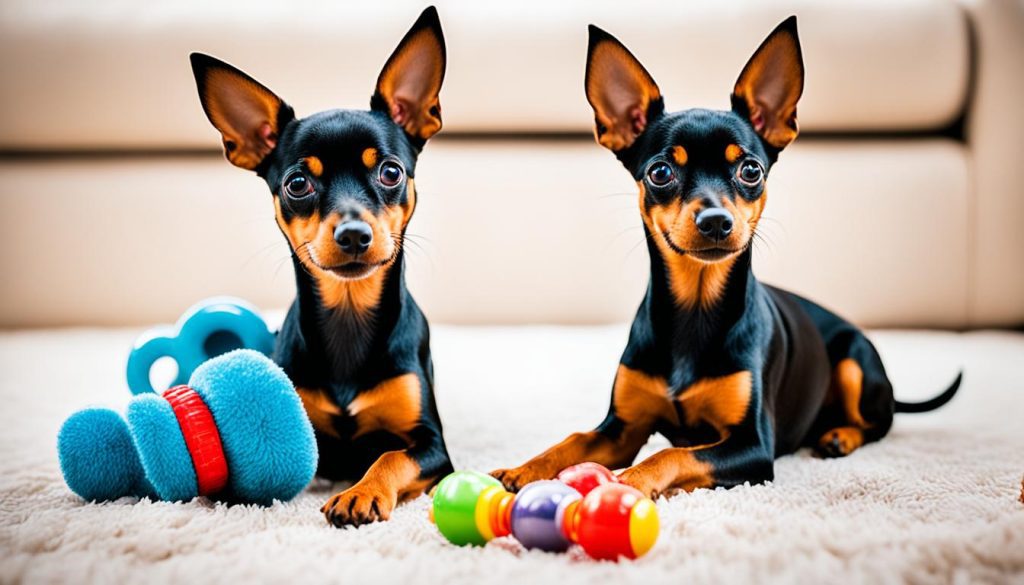
Miniature Pinscher Genetic Health Conditions
Miniature Pinschers, like any other breed, may be prone to certain genetic health conditions. It is important for owners to be aware of these conditions and take necessary measures to ensure their pets’ well-being. Here are some genetic health conditions commonly found in Miniature Pinschers:
1. Chondrodystrophy (CDDY) and Intervertebral Disc Disease (IVDD)
Chondrodystrophy and Intervertebral Disc Disease are skeletal disorders that can affect Miniature Pinschers. Chondrodystrophy is a condition that results in shortened limbs, while Intervertebral Disc Disease leads to the degeneration of spinal discs. These conditions can cause pain, mobility issues, and even paralysis.
2. Mucopolysaccharidosis VI (MPS VI)
Mucopolysaccharidosis VI is a severe metabolic disorder that can be found in Miniature Pinschers. It results in stunted growth and skeletal deformities, affecting the quality of life for the affected dogs.
To ensure the well-being of Miniature Pinschers, owners should work closely with their veterinarian to provide appropriate care and management. Regular check-ups, genetic testing, and screening for these conditions can help identify if a dog is a carrier or at-risk. Early detection and proper treatment can significantly improve the quality of life for Miniature Pinschers.
Remember, a healthy lifestyle, regular veterinary care, and responsible breeding practices are crucial in minimizing the impact of genetic health conditions in Miniature Pinschers.
Miniature Pinscher Suitability for Apartment Living
Are you considering getting a Miniature Pinscher as a pet but live in an apartment? You might be wondering if this energetic breed is suitable for apartment living. Well, I have good news for you! Miniature Pinschers can adapt well to apartment living due to their small size and moderate exercise needs.
Despite having energy and enjoying playtime, Miniature Pinschers don’t require extensive space or large yards. They are perfectly content with a comfortable and cozy apartment. However, it’s important to provide them with regular exercise and mental stimulation to prevent behavioral issues.
Apartment dwellers should keep in mind that Miniature Pinschers still need exercise, just like any other dog. Daily walks, interactive play sessions, and access to a safe outdoor space for bathroom breaks are essential to meeting their physical and mental needs.
Additionally, it’s important to address any potential barking tendencies that might disrupt your neighbors. Proper training and socialization are key to curbing excessive barking and ensuring that your Miniature Pinscher is a well-behaved apartment companion.
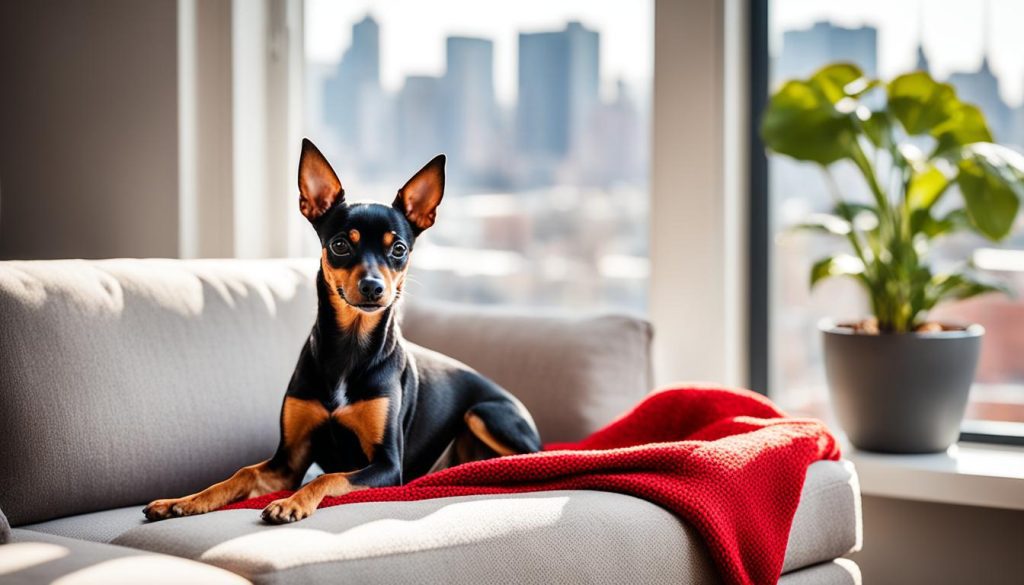
| Pros of Miniature Pinschers in Apartments | Cons of Miniature Pinschers in Apartments |
|---|---|
|
|
Training and Care Tips for Miniature Pinschers
Training and socialization are crucial for Miniature Pinschers to ensure they become well-behaved and well-rounded dogs. When it comes to training, positive reinforcement and reward-based methods work best with this breed. They respond well to praise, treats, and consistent, gentle guidance.
Establishing clear boundaries and providing mental stimulation are important for the overall well-being of a Miniature Pinscher. They are intelligent and curious dogs, so mental exercises like puzzle toys and interactive games can help keep them engaged and prevent boredom.
Regular exercise is essential for Miniature Pinschers to maintain their physical health and prevent behavioral issues. They have energy to burn and enjoy daily walks, playtime, and interactive activities. Engaging their natural instincts, such as using a flirt pole or participating in agility training, can be both mentally and physically stimulating for them.
Careful attention to nutrition is also vital for your Miniature Pinscher’s well-being. Provide them with a high-quality dog food that meets their nutritional needs. Portion control is important to prevent obesity, as Miniature Pinschers can be prone to weight gain.
Grooming is relatively easy with Miniature Pinschers. Their short, hard coat requires regular brushing to keep it healthy and remove any loose hair. Additionally, maintaining regular dental hygiene and addressing their grooming needs, such as nail trimming and ear cleaning, is essential for their overall health.
Tips for Miniature Pinscher Training:
- Start training early: Begin training and socialization as soon as you bring your Miniature Pinscher home. Early exposure to different people, animals, and environments will help them develop into well-adjusted dogs.
- Use positive reinforcement: Reward good behavior with treats, praise, or playtime. Avoid harsh punishment or yelling, as it can be counterproductive and damage the trust between you and your dog.
- Be consistent and patient: Training takes time and patience. Consistency in your commands, expectations, and rewards will help your Miniature Pinscher understand what is expected of them.
- Focus on basic commands: Teach essential commands like sit, stay, come, and leave it. These commands will provide structure and help keep your Miniature Pinscher safe in different situations.
- Provide mental stimulation: Engage your Miniature Pinscher’s mind with puzzle toys, interactive games, and training sessions. Mental exercise is just as important as physical exercise for their well-being.
| Care Tips for Miniature Pinschers | |
|---|---|
| Exercise | Provide daily walks, playtime, and mental stimulation to keep them physically and mentally healthy. |
| Grooming | Regular brushing, dental care, nail trimming, and ear cleaning are essential for their overall well-being. |
| Nutrition | Feed them a high-quality, age-appropriate dog food to maintain their optimal health. Control portions to prevent overfeeding. |
| Training | Use positive reinforcement techniques to train and socialize your Miniature Pinscher, establishing clear boundaries and promoting good behavior. |
By following these training and care tips, you can ensure that your Miniature Pinscher thrives and lives a happy, healthy life as a beloved member of your family.
Conclusion
Miniature Pinschers are known for their intelligence and trainability. While they may not rank as the smartest dog breed, their quick learning abilities and energetic nature make them a smart choice for potential pet owners. With proper training, socialization, and care, Miniature Pinschers can become excellent companions and family members.
Miniature Pinschers thrive in environments where they receive mental and physical stimulation. Their intelligence allows them to quickly grasp commands and learn new tricks. However, it’s important to remember that each dog is unique, and individual intelligence levels may vary. Consistent training, positive reinforcement, and patience are key to unlocking the full potential of these smart dogs.
Whether you live in a small apartment or a spacious home, Miniature Pinschers can adapt well to their surroundings. Their small size and moderate exercise requirements make them suitable for apartment living. However, it’s essential to provide them with regular exercise and mental stimulation to keep them happy and prevent behavioral issues.
If you’re looking for a smart and energetic companion, Miniature Pinschers are a great choice. With their intelligence, trainability, and loyal nature, they can bring joy and entertainment to your life. Remember to nurture their intelligence through proper training and care, and you’ll have a loving and intelligent Miniature Pinscher by your side.

